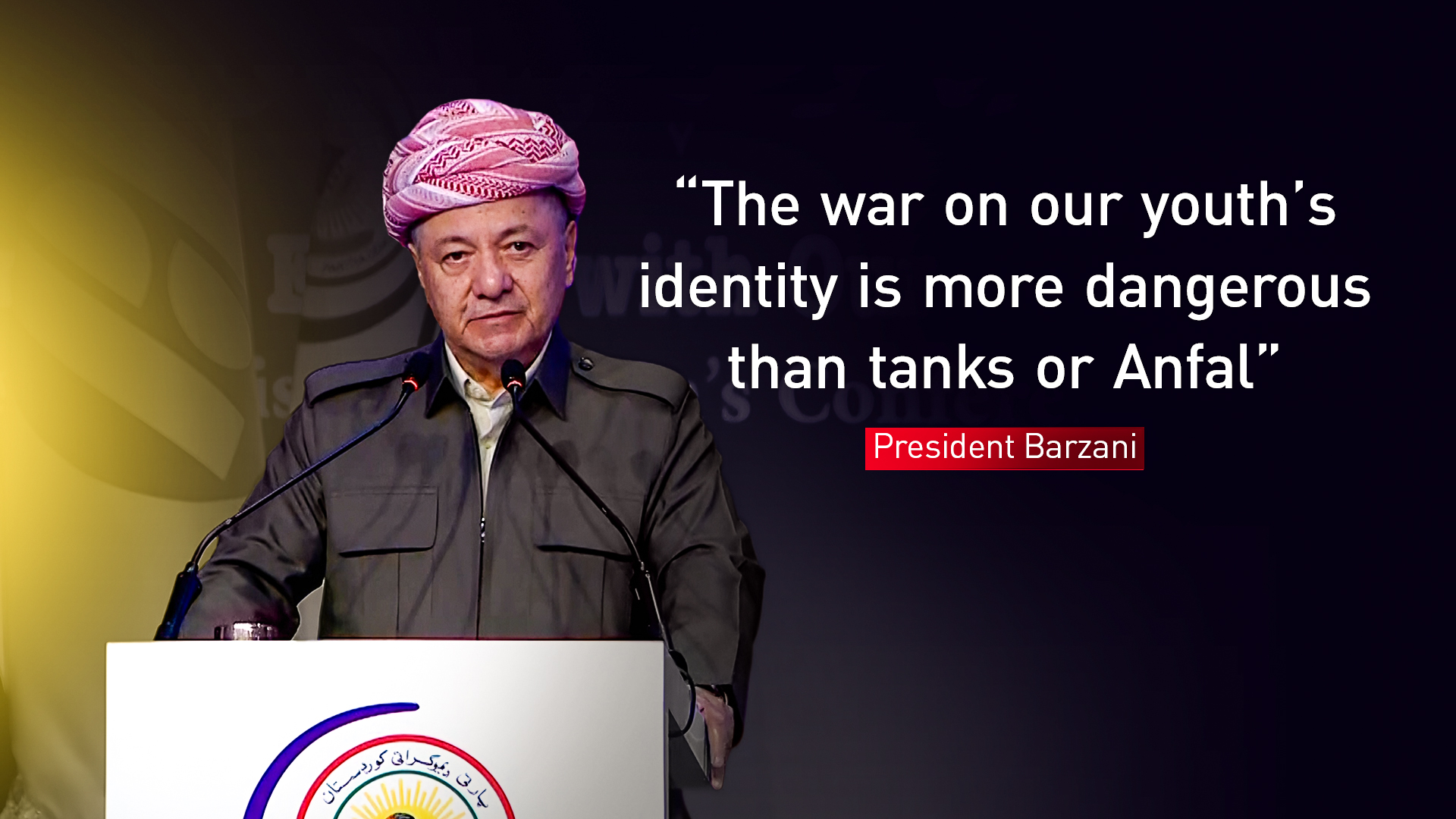‘At Times Even Greater’: President Barzani Highlights Pivotal Role of Kurdish Women
President Barzani warned of ongoing ideological warfare targeting Kurdish youth, calling it “more dangerous than tanks, planes, chemicals, or even the Anfal campaign.” He added, “Without a sense of national belonging, a person is lost.”

By Kamaran Aziz
ERBIL (Kurdistan24) — In a powerful affirmation of women’s historical and future roles in Kurdish society, President Masoud Barzani delivered an impassioned speech on Saturday at the opening of the First Kurdistan Women’s Conference in Erbil. The two-day event, attended by key political figures including Kurdistan Democratic Party (KDP) Deputy President Masrour Barzani, marks a significant milestone in institutionalizing women’s rights and leadership across the Kurdistan Region.
"In the name of God, the Most Gracious, the Most Merciful, dear sisters and daughters, esteemed participants," President Barzani began, addressing the hall filled with female activists, educators, Peshmerga veterans, and public officials. "I am very pleased to be here with you today at this first-of-its-kind conference. I hope the outcomes meet the expectations we all share and that this serves as a promising beginning."
President Barzani underscored the enduring and central role of Kurdish women throughout modern history, noting their contributions during major resistance movements and armed conflicts. "The role of Kurdish women has never been less important than that of men—perhaps at times, even greater. In the September and Gulan Revolutions, and the fight against ISIS, women played remarkable roles—especially during the Gulan Revolution. They were mothers, teachers, farmers. That is the reality."
He recalled poignant images of women shielding their children from airstrikes and acting as logistical backbones to the Peshmerga on the frontlines. "The Peshmerga's food was once again the responsibility of Kurdish women. A Peshmerga on the frontlines knew his mother, sister, or wife would make sure he was fed. So, whatever is said about Kurdish women, it is never enough."
President Barzani highlighted historical female figures such as Dayka Amina, Dayka Halima, and Dayka Aisha, who embodied resistance during the Gulan Revolution, and also praised the bravery of Kurdish women during the war against ISIS. He made special mention of Leyla Qasim, the first woman executed in Iraq, whose defiant refusal to ask then-President Ahmed Hassan al-Bakr for a pardon turned her into a national symbol. "They told her to write a letter to Ahmed Hassan al-Bakr asking for forgiveness. She replied: 'You are less than that—I will not write a pardon letter to you. I ask forgiveness only from my own people.'"
President Barzani's speech also focused on contemporary challenges, particularly ideological and psychological warfare aimed at detaching Kurdish youth from national identity. "That war they waged against us was, in my view, far more dangerous and significant than any tank, plane, chemical, or even the Anfal campaign. If someone has no sense of belonging to their nation, they are lost, without value."
Calling on women to play an active role in society, education, and national preservation, he warned of the risks a land faces without a conscious, committed generation. "A person without a homeland is lost, worthless, and unrecognized. And a land without a nation is meaningless. Therefore, people and homeland are bound together."
President Barzani praised the growing presence of women in education and professional sectors, reaffirming his support for their leadership. "Your conference slogan is beautiful: 'Building the future with our strength.' I say to you: with your abilities, build the future, and we will support you."
He cited the long-standing Barzani tradition of advocating for women’s rights, recalling that over 120 years ago, Sheikh Abdul-Salam Barzani and Sheikh Ahmad promoted women’s dignity and opposed harmful traditions such as forced marriage. "Forced marriage of girls is an extreme crime. It should be voluntary, for both girls and boys. Women were given the opportunity to play their role, women felt their own existence."
As the Kurdistan Region prepares to commemorate Anfal Day, President Barzani paid tribute to the many Kurdish mothers and children martyred during Saddam Hussein's genocidal campaign. "Tomorrow is Anfal Day. Hundreds, perhaps thousands, of mothers were buried alive with their children. We send our salute to the pure souls of all those martyrs—especially the mothers buried with their children."
He concluded with a call to action, urging continued struggle and national resilience through the empowerment of women. "What matters now is that the struggle continues. We must not give up. All doors and opportunities must be opened for women to fully realize their roles—and I am confident you can. I reaffirm again: carry out your slogan, and we, with all our strength, will stand behind you. I wish your conference great success. May you succeed, and thank you very much."
The conference, launched under the theme "Building the Future with Our Strength," continues into its second day with panels, workshops, and testimonials aimed at crafting policy and advocacy agendas for Kurdish women's social, political, and economic empowerment.
